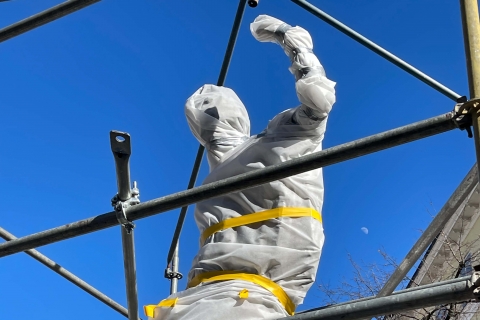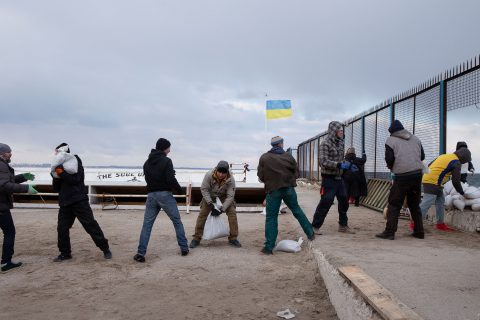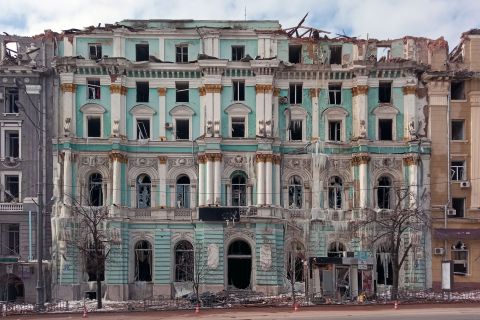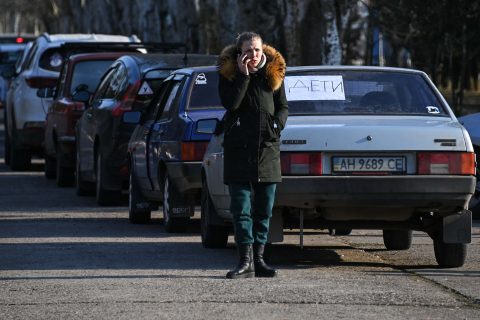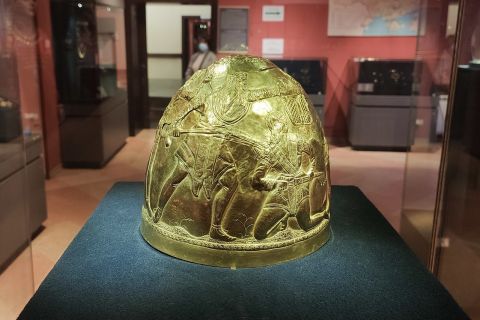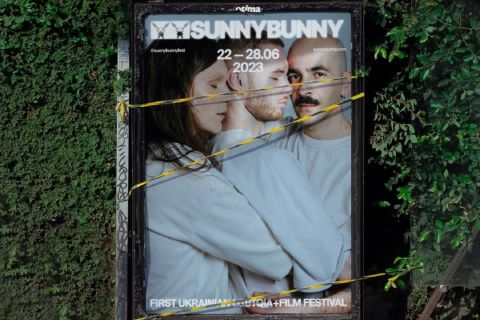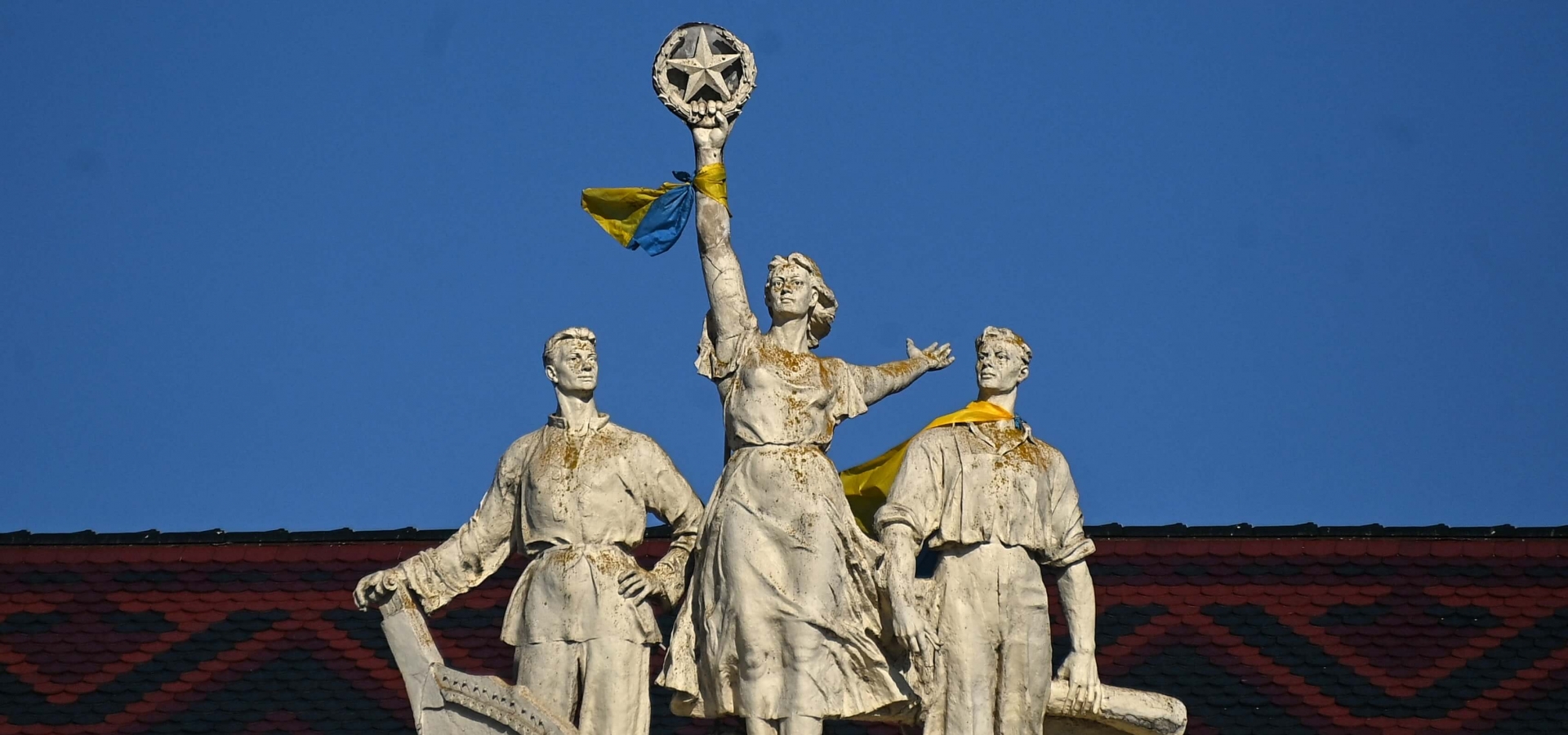
“They Came at 5 AM”: Russian Terror and Intimidation in the Occupied Ukrainian South
According to preliminary estimates, Russian troops have abducted about ten Ukrainian officials and over two dozen activists since the war began. Most of them were released, and some had to be exchanged for captive Russian soldiers. The abductions had a variety of objectives. Russian invaders pressured the officials into resigning or collaborating and activists into ceasing their activities.
Bird in Flight talked to journalist Oleh Baturin from Nova Khakhovka and activist Oleksandr Vlasov from Kherson. The former was abducted and spent eight days in captivity. The latter endured a morning search in his home together with his wife. Both were released and stayed in their cities despite the danger. Oleh and Oleksandr told us about how Russian soldiers behaved, what they were asked during interrogation, and why they believe that locals are connected to the repressions.

Spent eight days in captivity.
How were you captured?
On Saturday, the 12th of March, Serhii Tsyhipa, an activist I know, called me and offered to meet one-on-one at the railway station. When I came, I saw from the corner of my eye that soldiers were running toward me. They swarmed me, shouting, and twisted my arms behind my back. Then they threw me on the back seat of a mini-bus. Someone put their foot on my back and hit me with the butt of their rifle to keep me down.
Then they brought me to the Nova Kakhovka City Council building. And that was where the interrogation began. After that, they moved me to the Nova Kakhovka police station, where the interrogations continued. When they were done, they just handcuffed me to the heating radiator and left me like that for the night. The room was unheated, so the winter coat saved me.
The following day, they brought me to Kherson, where I spent most of the time—first in the Regional State Administration building and then in pre-trial detention.
What did they ask you during interrogations?
They asked about my place of employment and position. Moreover, they demanded that I disclose the names of the nationalists in the region, the people behind rallies in Nova Khakhovka and Kherson, and those who ran Telegram channels. The questions were all the same, just formulated differently.
Meanwhile, nobody cared to explain why I was detained and on what charges.
How did the Russians behave?
Like brutes. On the first day, they said they would kill and bury me. While on the move to Kherson the following day, I was sure they were heading somewhere to dispose of me.
What happened in pre-trial detention?
They ceased threatening me once I was there. Still, it felt unpleasant. I was put into solitary confinement, and there were more prisoners in the adjacent cells. I heard much of what was going on there, and, from what I heard, I understood that the Russians held Joint Forces Operation soldiers in those cells.
I heard them asking about ranks and if the soldiers killed people. And then they threatened that Donetsk and Chechen militants would arrive soon and make quick work of those soldiers. Judging by the sounds, they did horrible things there.
Were the Russians beating up our soldiers?
The Russians did beat them up, tortured them even. I really hope that I will never hear those sounds again in my life.
Did they feed you?
They fed me for the first time on Monday, a day and a half after detaining me. It was something from dry rations. They didn’t warm it up, and it was impossible to eat, but I had to. I had to be able to stand on my feet, at least. Before that, they gave me some water once, but only because my throat was so dry that I couldn’t speak.
Your interrogators, were they Russians?
Most of them definitely were. Those who transported us were Russians because they asked to translate some Ukrainian words and tried to pronounce “palianytsia” (A type of Ukrainian bread. The word has become a shibboleth during the war—translator’s note). I heard one of them call his family on the phone. They talked over the loudspeaker. He asked his wife if she wanted any souvenir, and she answered, “Just come back alive yourself.” Then he talked to his son, and I noticed the kid’s Russian accent.
However, there were some locals among the Russians, too. One of the men that approached us in the Kherson Regional State Administration kept switching to a mix of Russian and Ukrainian. From what I could hear, he was familiar with the building. I didn’t see his face, though.
In some cities, people say that a part of Russian troops seems not to understand what they are doing here. What do you make of those who you saw?
It looked as if they were disoriented and had no centralized decision-making. It looked outright absurd. In the first location, they asked me about nationalists and threatened to kill me. In Kherson, it felt as if the Russian didn’t give a damn about the problems in Nova Kakhovka.
I remember there was a rally in Kherson one day. A whole lot of people took to the streets. The air was ringing with hate. What the Russian soldiers who guarded me saw in the window shocked the sh*t out of them. They exchanged a few words, and one of them said: “We came here to defend them, and still, they keep protesting.”
How did you know that you would be released?
On Friday evening, they took my fingerprints, wrote down my personal information, and for some reason, as far as I could tell, made a PCR test for me. Then they said they had found a car to take three other people and me back to the city.
They could get the answers to their questions without detaining you. Why did they hold you for eight days, in your opinion?
I have a hypothesis—and a number of sources prove it—that my abduction was organized by one of my numerous enemies. Even before, they threatened me, so I believe that it was them who put the Russians on my trail.
Who are those people?
They are local Russian supporters. And they are cross with me. The Russians tried to break me mentally on their behalf, it seems.
Aren’t you scared to stay in the city after that?
I’m scared, naturally. And I’m worried about my friends and family. Besides, I realize that I won’t be able to work in such conditions. Currently, I’m trying to get enough sleep and recoup. Then I will start looking for ways to get out.

Had his home searched.
Tell us, please, how the search went.
They came at 5 a.m. There were five of them, all armed, wearing balaclavas, and in full military gear. They knocked on my window, so I had to let them in. I knew they would come, but it was still a surprise—searches are usually random.
How did the Russians behave?
They behaved properly. There was no rudeness on their part, and they didn’t even wake up my sleeping kid. From how clearly formulated and cold-blooded their questions were, I figure those were the Federal Security Service (FSB) people. They started by asking what I did for a living and if I were a member of a pro-Ukrainian organization. Then they inquired about my attitude toward Russia. It all felt like soft pressure as if to say that we were under their surveillance and that armed people were ready to burst into our house any minute.
What did they ask you about?
At one point, one of the the FSB operatives asked if we wanted to live in Russia. I said I didn’t, and then he asked why, implying that the people lived just fine in Crimea. He also kept insisting that Russians came to liberate us. When we asked who were they liberating us from, their answer was: from Zelenskyi and Nazis. The situation felt surreal because we spoke Russian all the time. We also had a short discussion about the difference between Crimea and Kherson and that the peninsula was not bombed while half of the Kherson Region lay in ruins. The FSB operative then said they were here to stay and would rebuild everything.
Having searched our home for 90 minutes, they found nothing. Still, they took our electronics and said they would study my files and come back if they found something.
What struck me was how well informed the soldiers were. There is no address plate on the block of flats where I live. Even taxi drivers don’t know how to find it. And then our flat is not that easy to pinpoint because of the weird planning. The Russians must have learned not only the address but also the very window they had to knock on. I am pretty sure that someone from the Kherson police tipped them off—I have had problems with local police officers since 2014 because of Maidan.
Are there many collaborators in Kherson?
There are some. Take Kyrylo Stremousov, for instance. He is a pro-Russian activist, with which our authorities toyed for the past ten years, first initiating cases against him and then closing them. Stremousov holds rallies in Kherson, at which he insists that Viktor Yanukovych is the only legitimate president of Ukraine and that our country is teeming with fascists.
The Kherson mayor is trying to tread lightly, keeping the city going and even returning trolleybuses on the streets. All the while, he made no pro-Russian statements.
If rallies continue, the Russians may take more aggressive actions, starting to abduct people, for instance. I mean, they are already doing it, but they may very well double down.
The Russians declare that they are here to stay, but I don’t think so. Emotions aside, it is evident that they are not interested in rebuilding Kherson’s ruined economy. They are in a lot of trouble as it is because of sanctions, and having to support another republic would be unsustainable for them.
Cover photo: Sputnik via AFP. Editorial note: Sputnik is a Russian state-funded news agency
